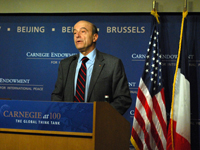Registration
Thank you!
You will receive an email confirming your registration.
With European governments considering defense spending cuts and NATO preparing to implement its new strategic concept, transatlantic security cooperation is in a state of flux. Against this background, French Defense Minister Alain Juppé addressed the state of the U.S.-French strategic partnership and its prospects for the years ahead at an event hosted by Carnegie. Carnegie’s Douglas Paal moderated.
A Shared Vision
Minister Juppé began his remarks by emphasizing that the United States and France share a similar vision for the world and an intrinsic alignment of values and goals.
- Shared Challenges: France currently presides over both the G8 and the G20. Juppé said that France will use its term to identify solutions to the borderless challenges that face both the United States and Europe. Such challenges include terrorism, proliferation of weapons of mass destruction, piracy, organized crime, drug trafficking, energy security, and access to crucial resources such as water and raw materials.
- Space Security: One key area of mutual interest between the United States and France is outer space. Juppé described a declaration that he and U.S. Defense Secretary Robert Gates recently signed, intended to help ensure the long-term security and safety of space activities.
- Cyber Security: France and the United States have been increasing cooperation on both offensive and defensive cyber capabilities, Juppé reported, and the two nations have focused both on operational and technological concerns in this increasingly important realm.
Nuclear Deterrence and Missile Defense
- Nuclear Weapons: Juppé praised New START (the new arms reduction and monitoring agreement between the United States and Russia), but emphasized the continuing role for nuclear deterrence in enhancing international security. Ballistic missile and nuclear weapons proliferation remains a serious global threat, he said, giving impetus to NATO’s commitment to deploy anti-missile defense systems to complement (but not replace) nuclear deterrence.
- Cooperative Missile Defenses: Juppé expressed optimism about the renewed strategic partnership between NATO and Russia declared at the NATO Lisbon Summit. Although Juppé said many questions remain about the details of a prospective shared missile defense capability for NATO—including the system of control and command, funding responsibilities, burden-sharing, and the system’s location—he is confident that dialogue amongst NATO allies would lead to progress on these issues.
- Iran and North Korea: Juppé identified the nuclear programs of Iran and North Korea as areas of particular international concern. He highlighted the strong effect that sanctions have had on Iran and credited them for helping to bring Tehran to the table for recent talks in Geneva and Istanbul. A unified and vigilant stance by the P5+1 is imperative, he said. Turning to Korea, Juppé voiced support for South Korean President Lee Myung-bak and said that multilateral six party talks must resume soon.
NATO and Europe in the Twenty-First Century
- Doing More with Less: Although he shared Secretary Gates’s concerns about European “de-militarization,” Juppé said the EU must remain ambitious about its role as a global political power and that this required a correspondingly robust defense capability. Given current economic concerns, maintaining such capabilities will require Europe to streamline its assets and reduce inefficiencies, he said. As an example, he cited the landmark 2010 Lancaster House Treaty signed between France and the UK, which seeks to pool the two nation’s military resources.
- Commitment to Afghanistan: NATO’s efforts in Afghanistan are crucial to “to maintain the credibility of the Western world”, Juppé said. He recounted the history of French involvement in the coalition effort, and reiterated that the troop withdrawal scheduled for 2014 would be accompanied by a continued role in training Afghan military and police forces. He added that ongoing European and U.S. support for stability in neighboring Pakistan is critical.
Engaging with a Multi-Polar World
- European Involvement: Only a decade ago, Juppé said, it would have been unimaginable to think that the EU would have 20 on-going security operations around the globe. Currently, EU troops are engaged as peacekeeping forces in the Congo and deployed in “Operation Atlanta,” the EU’s first naval operation, which is currently conducting anti-piracy patrols off the Horn of Africa. In addition, France and the United States are working closely together to fight terrorism in African states. Juppé added that France has encouraged other European nations to more closely link security and development strategies in order to better address the threat of terrorism.
- “A Strategic Bet on Democracy”: Acknowledging the unique relationship that exists between France and the North African countries of Tunisia and Algeria, Juppé reported that the French government has paid close attention to the recent surge in grassroots protests throughout the Arab world. He emphasized that the West should support the nascent democratic movement in Egypt as the only course of action consistent with Western values while remaining vigilant for potential problems of extremism.
- Eyes on China: Responding to a question from Paal on the European attitudes toward Chinese military power, Juppé acknowledged that the Chinese defense budget is rapidly increasing, but pointed out it remains small compared to that of the United States. He noted that Europe has chosen to develop a strategic partnership with China and that the ability to maintain a frank dialogue is imperative—both on issues of human rights and in relation to China’s role in the broader military equation—for the relationship to succeed.
